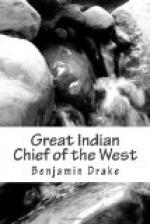creek. Soon after they had halted, five more
Indians, with apparent pacific intentions, were seen
approaching the camp. Captain Eades, with a party
of armed troops, dashed at full speed towards them,
when they became alarmed and commenced a retreat.
The Captain, after following them for some distance,
and killing two of the party, gave up the pursuit,
and was on his return to the camp, when he was met
by the whole detachment. The pursuit of the retreating
Indians was immediately renewed, and continued until
both parties had crossed Sycamore creek. This
brought them upon the camp of Black Hawk, who having
been apprized of the approach of the whites, had mounted
his men and prepared for action. The Indians
were concealed behind some bushes, and after having
fired their guns, raised the war-whoop and resorted
to the tomahawk. Their fire was returned, with
but little effect, and then Major Stillman, instantly
ordered a retreat across the creek, and the route
became general. His troops fled through their
camp, and did not stop until they reached Dixon’s
ferry, distant thirty miles. Some of them deemed
it prudent to seek a place of still greater safety,
than the flag of General Atkinson, and continued their
flight for more than fifty miles, and until they reached
their own fire-sides. The roll was called at
Dixon’s ferry next morning, and fifty-two were
found missing. It was, however, subsequently
ascertained that more than half of this number were
among those who rode express to the “settlements”
to carry the news of their gallant attack upon General
Black Hawk and his British band. Such was the
panic among the troops engaged in this skirmish, that
they reported the Indian force at 1500 and even 2000
men! Black Hawk’s statement has already
been given, in which he places his number at forty;
and one of the volunteers whose horse was lame, and
who hid himself, and watched the Indians as they passed
him in the pursuit and on their return, did not estimate
them at more than a hundred. It is probable the
real number of the Indians did not exceed fifty.
It is painful to contemplate this whole affair, for
it is alike discreditable to the national faith and
the national arms. The violation of a flag of
truce, and the wanton destruction of the lives of some
of those who bore it, not only placed an indelible
stigma upon the character of the country, but led
to a war, in the prosecution of which, much blood and
much treasure were expended. Had a conference
with Black Hawk been held, scarcely a doubt remains,
considering his failure to secure the co-operation
of other tribes, and his utter destitution of provisions,
that he and his band would have returned, peaceably,
to the west side of the Mississippi. The precipitate
flight of the troops under Major Stillman, has no
justification. Supposing the panic to have been
such as to render a retreat across Sycamore creek
necessary, it should have terminated when the troops
reached their encampment; which, being in a copse




